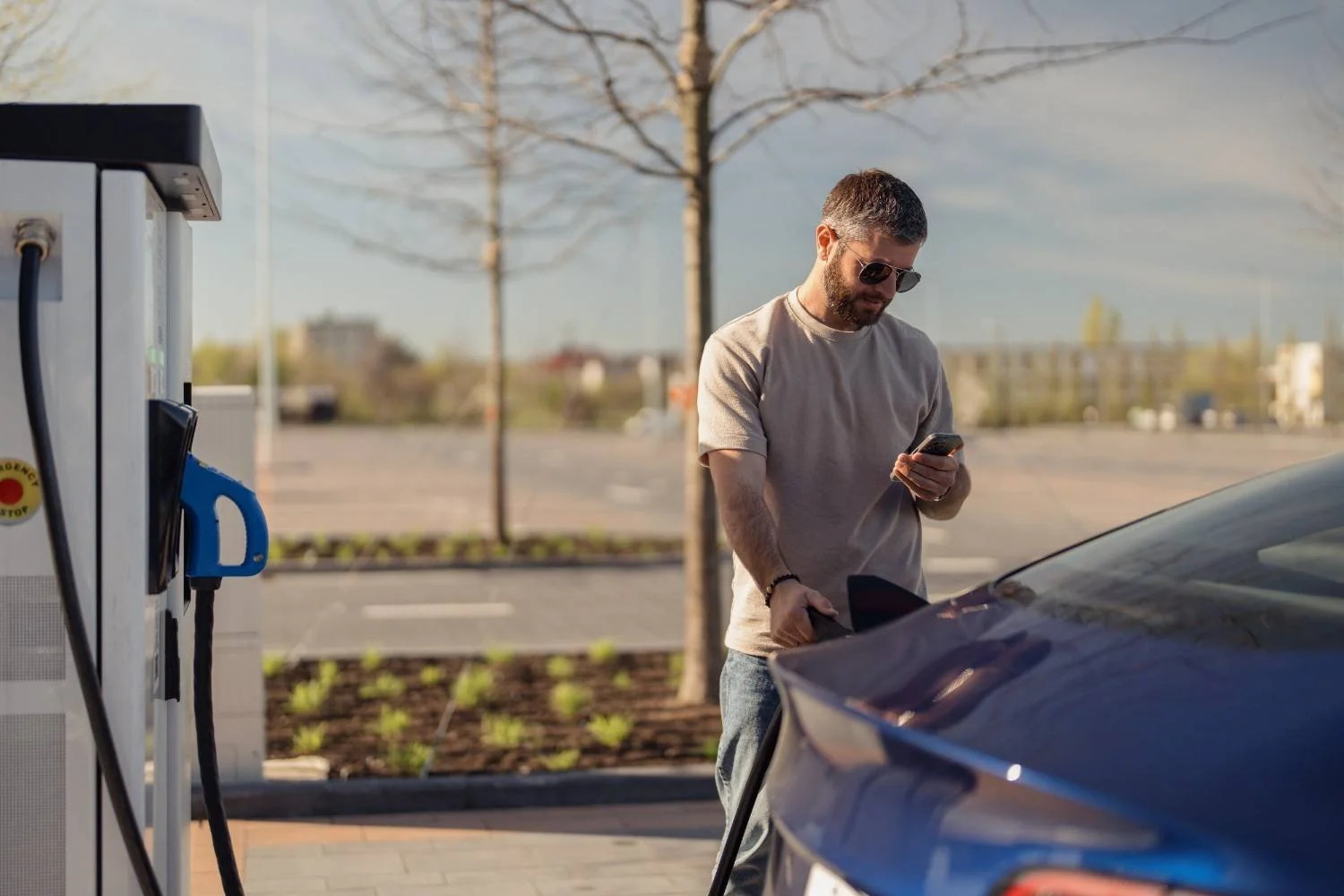How Salary Sacrifice Charging Works: Save 20-50% on EV Charging Costs
Source: Shutterstock
Charging an electric car in the UK has become more expensive - especially when using public chargers. Domestic energy prices on standard variable tariffs (SVT) averaged £1,849 per year in June for dual fuel customers, according to Ofgem's latest retail market indicators, which translates to a price cap of about £0.257 per kWh for home charging at that time. Public charging costs often exceed these rates. These standard variable tariffs, to which most households default with their energy suppliers, represent the baseline cost of charging your EV at home.
While electric vehicles remain cheaper to run than petrol or diesel cars when charging at home, those who rely heavily on public charging often face costs that exceed this. For people without access to home charging this creates a financial barrier, making the transition to electric vehicles feel unattainable.
The solution? Salary sacrifice EV charging. This allows employees to reduce their electric car charging costs by 20-50% through pre-tax deductions. This guide will explain how salary sacrifice charging works, the implementation process and the employee EV charging benefits that make this an attractive addition to any business EV charging strategy.
The EV Charging Cost Challenge
Before exploring how salary sacrifice charging works, it's important to understand the scale of the public charging cost problem facing UK drivers. Popular network, Instavolt charges 87p/kWh (22p per mile), with even discounted rates of 54p/kWh costing 18p per mile.
Over 9 million households in the UK lack access to off-street parking, forcing them to rely entirely on public charging infrastructure. These drivers face electric car charging costs that can exceed £3,000 annually for typical mileage - a significant financial burden that salary sacrifice car schemes don't address.
This is where The Charge Scheme comes in, offering the UK's first and only salary sacrifice solution specifically designed for EV charging costs.
Understanding Traditional Salary Sacrifice
Salary sacrifice has been a popular employee benefit in the UK for decades. This is a legal arrangement where employees agree to give up part of their gross salary in exchange for benefits. Because the benefit is provided before tax and National Insurance calculations, employees save money while employers reduce their National Insurance contributions.
Common salary sacrifice benefits include pension contributions, cycle-to-work schemes, and company cars. However, until recently, no solution has existed to help employees manage their EV charging costs through this method.
How Salary Sacrifice Charging Works: The Complete Process
The salary sacrifice charging process involves four straightforward steps that integrate with your company's existing payroll systems, whilst delivering a great benefit that employees will enjoy!
Step 1: Employee Setup and Registration
Employees start by downloading The Charge Scheme app and setting up their account. The process is simple and only takes a couple of minutes. They’ll receive a physical Charge Card that works across over 69,000 public charging points throughout the UK.
The app provides access to the UK's most comprehensive charging network, including major operators like BP Pulse, Shell Recharge, and Pod Point. Employees can find nearby chargers, check availability, and start charging sessions directly through the app.
Step 2: Charging and Payment
When employees need to charge their electric vehicles, they use The Charge Scheme app (or card) to pay for charging sessions. This works whether they're charging at home (through meter readings), at the office, or in public.
The system automatically tracks all charging activity, creating a detailed record of costs and usage patterns. This eliminates the need for employees to collect receipts or manually track expenses – everything is handled digitally.
Step 3: Monthly Mileage Submission
Each month, employees submit their mileage through The Charge Scheme portal. This process takes as little as 10 seconds. The system uses this information to calculate the proportion of charging costs eligible for salary sacrifice, making sure there is an accurate separation between personal and business use.
The platform automatically calculates charging costs based on vehicle efficiency, charging patterns, and actual usage data. This removes any guesswork, meaning employees save on their personal EV charging expenses!
Step 4: Payroll Adjustment and Tax Savings
The final step involves The Charge Scheme providing detailed payroll instructions to employers. The calculated charging costs are then deducted from employees' gross salary before tax and National Insurance calculations.
This pre-tax deduction is where the magic happens – employees can start saving 20-50% on their charging costs immediately (depending on their tax bracket). Higher-rate taxpayers see the most substantial savings, whilst even basic-rate taxpayers achieve significant reductions in their overall charging expenses. This makes HR EV charging schemes like The Charge Scheme particularly attractive because they deliver tangible financial benefits that employees truly value.
The Financial Benefits: How Employees Can Save 20-50% on EV Charging
The salary sacrifice charging benefits are measurable. Let's break down exactly how much employees can save using real-world examples.
How This Works For Basic-rate Taxpayers
Consider Sarah, a basic-rate taxpayer who typically drives 15,000 miles annually in her Tesla Model 3. She relies primarily on public charging due to living in a flat without off-street parking:
Public charging (measured through The Charge Scheme app) - £7,290
Other charging (home or office) - NA
Total charging cost (added to net pay as expense reimbursement) - £7,290
Salary sacrifice (from your gross pay) - £8,019
Net energy cost (added to your net pay as a reimbursement) - £5,774
Savings (over three years) - £1,516
Through salary sacrifice, Sarah pays £5,774 net for £7,290 of charging costs, saving £1,516 over three years
How This Works For a Higher Rate Taxpayer
Now consider James, a higher-rate taxpayer with the same car, similar driving patterns and charging needs.
Public charging (measured through The Charge Scheme app) - £7,290
Other charging (home or office) - NA
Total charging cost (added to net pay as expense reimbursement) - £7,290
Salary sacrifice (from your gross pay) - £8,019
Net energy cost (added to your net pay as a reimbursement) - £4,651
Savings (over three years) - £2,639
James's £7,290 annual charging costs require an £8,019 gross salary deduction, but his net cost is £4,651 – saving £2,639 over three years.
How This Works For a Higher Rate Taxpayer Who Mainly Charges At Home
Emma is a higher-rate taxpayer who drives 15,000 miles per year in her Tesla Model 3. She has home charging available, so while most of her charging happens at home, she uses public chargers when travelling.
Public charging (measured through The Charge Scheme app) - £2,490
Other charging (home or office) - £2,079
Total charging cost (added to net pay as expense reimbursement) - £4,558
Salary sacrifice (from your gross pay) - £5,013
Net energy cost (added to your net pay as a reimbursement) - £2,908
Savings (over three years) - £1,650
The scheme works effectively across all tax brackets: Sarah achieves meaningful savings of £1,516 over three years as a basic-rate taxpayer, while James's higher tax rate delivers even more savings of £3,966 from the same charging costs. You can calculate your savings by letting us know the make and model of your car, your annual mileage and your charging habits!
Implementing The Charge Scheme at Your Company: Zero Cost, Maximum Impact
The salary sacrifice charging process is designed to integrate easily with existing HR and payroll systems, offering fleet EV charging solutions that work for companies of all sizes.
The Initial Setup
Once your company has decided to implement The Charge Scheme, you’ll be taken through an onboarding process. The system integrates with your existing payroll software, regardless of whether it’s handled internally or through third-party providers.
The implementation requires no changes to existing company car schemes or leasing arrangements. The Charge Scheme bolts directly onto existing benefits packages, making it an ideal addition rather than a replacement.
Ongoing Admin Support
Monthly administration involves processing the payroll adjustments provided by The Charge Scheme. These come with clear instructions and integrate with standard payroll processes, requiring minimal additional work from HR teams.
The system handles all complex calculations, including the separation of personal and business charging costs, ensuring HMRC compliance and reducing administrative burden on employers.
Tax Benefits and HMRC Compliance
Salary sacrifice charging benefits operate within established HMRC guidelines for salary sacrifice arrangements.
Benefit-in-Kind Considerations
Unlike company cars, charging costs managed through salary sacrifice don't typically create additional benefit-in-kind tax liabilities. This means employees receive the full value of their tax savings without offsetting charges.
National Insurance Savings
Both employees and employers benefit from National Insurance savings on salary sacrificed amounts. This creates additional value beyond the income tax benefits, contributing to the overall 20-50% savings employees experience.
Integration With Existing Company Benefits
Beyond the direct charging savings, The Charge Scheme enhances existing employee benefit packages by filling a gap in how accessible EVs are.
Company Car Schemes
The charging benefit can be combined with other salary sacrifice arrangements, subject to minimum wage considerations. This flexibility allows HR EV charging schemes to integrate seamlessly with existing benefits whilst maintaining compliance with HMRC regulations.
This integration means businesses don't need to switch providers or restructure existing benefits – The Charge Scheme simply bolts onto current offerings.
Electric Car Schemes
For companies using The Electric Car Scheme or similar EV salary sacrifice programmes, adding The Charge Scheme creates a well-rounded EV mobility package. Employees can save on their vehicle and charging costs, maximising the financial benefits of going electric.
Other Employee Benefits
The charging benefit can be combined with other salary sacrifice arrangements, subject to minimum wage considerations. This flexibility allows employees to optimise their entire benefits package whilst maintaining compliance with HMRC regulations.
Shaw Education Trust: Adding Charging Benefits That Work
Shaw Education Trust added The Charge Scheme to their benefits package earlier in the year.
Stephen Watson, Chief People Officer at Shaw Education Trust, explains their experience: "Since implementing The Charge Scheme as a zero-cost addition to our benefits package, we've seen remarkable enthusiasm from our team. The ability to save 20-50% on all charging costs through salary sacrifice has removed a significant barrier for educators considering the switch to electric vehicles." The trust found that EV salary sacrifice charging for HR teams was straightforward to implement, requiring minimal ongoing administration.
The trust's success with The Charge Scheme builds on their positive experience with The Electric Car Scheme, where they've helped employees save 20-50% on vehicle costs while maintaining complete risk protection for the business. By adding charging benefits, they've created an electric mobility package that supports their sustainability goals whilst delivering tangible financial benefits to their 2,000+ employees.
Environmental and Corporate Benefits
Beyond the direct financial advantages, salary sacrifice charging delivers a wide range of benefits for both employees and employers.
Environmental Impact
By making EV charging more affordable, salary sacrifice schemes accelerate the transition to electric mobility. This directly supports corporate sustainability goals and contributes to national Net Zero targets.
Employee Satisfaction
Employee EV charging benefits extend beyond just cost savings. Providing meaningful financial benefits through programmes, like The Charge Scheme, can boost employee satisfaction and retention. In competitive job markets, having a list of benefits that employees actually want to use can be a key differentiator when choosing their next role.
Corporate Social Responsibility
Adding salary sacrifice charging to benefits packages shows a company's commitment to supporting sustainable employee transport. This aligns with broader ESG objectives and has the potential to improve corporate reputation among stakeholders (especially those who are environmentally conscious).
Getting Started: Your Salary Sacrifice Charging Checklist
Interested in learning more about The Charge Scheme for business? Here’s how you can get started, whether you’re a decision-maker at the company or an employee interested in the scheme.
Employee Checklist
If you're interested in accessing 20-50% EV charging savings through your employer, here are some steps to help get the scheme introduced at your company.
Before Approaching Your Employer:
Calculate your current annual charging costs
Estimate potential tax savings using the savings calculator
Research your company's existing salary sacrifice policies
Initial Conversations:
Speak with your HR team about introducing The Charge Scheme
Complete employee registration and setup
Download the app and familiarise yourself with functionality
Begin using the system for all eligible charging
Ongoing Management:
Submit monthly mileage readings promptly
Monitor charging costs and savings through the app!
Employer Checklist
Evaluation Phase:
Assess employee interest and EV adoption rates
Review integration requirements with existing salary sacrifice schemes
Consider alignment with corporate sustainability goals
Implementation Phase:
Partner with The Charge Scheme for setup
Integrate with payroll systems and processes
Communicate benefits to employees effectively
Provide training and support materials
Ongoing Administration:
Process monthly payroll adjustments
Monitor employee participation and feedback
Review how The Charge Scheme is performing and the ROI
Evaluate any additional employee requests or needs
With savings of 20-50% on charging costs, comprehensive coverage across home, work, and public charging, and seamless integration with existing benefit programmes, salary sacrifice charging represents the future of workplace EV support.
The combination of immediate financial benefits, environmental impact, and how easy it is to run makes this a consideration for any business serious about supporting employee transition to electric vehicles. As charging costs continue to rise and EV adoption accelerates, the Charge Scheme for business provides a sustainable solution that benefits employees, employers, and the environment.
The question isn't whether salary sacrifice charging will become standard practice - it's how quickly businesses will recognise the opportunity and implement this game-changing benefit for their teams!
You Might Also Like…
Last updated: 04/09/2025
Our pricing is based on data collected from The Charge Scheme Calculator. All final pricing is inclusive of VAT. All deals are subject to credit approval and availability. All deals are subject to excess mileage and damage charges. Prices are calculated based on the following tax saving assumptions; England & Wales, 40% tax rate. The Charge Scheme is a product of The Electric Car Scheme™ – a trusted, trademarked brand dedicated to making electric driving more affordable. All rights reserved. The Electric Car Scheme is the trading style of The Electric Car Scheme Limited (company number 12646157, ICO number ZB030706, VAT number 439430195) and The Electric Car Scheme Holdings Limited (company number 13295877, ICO number ZB252629). Head office & registered address: The Shipping Building, 254 Blyth Road, Hayes, UB3 1HA. The Electric Car Scheme Limited provides services for the administration of salary sacrifice employee benefits. The Electric Car Scheme Holdings Limited is a member of the BVRLA (10608) is authorised and regulated by the FCA under FRN 968270, is an Appointed Representative of Marshall Management Services Ltd under FRN 667174, and is a credit broker and not a lender.
Copyright and Image Usage: All images used on this website are either licensed for commercial use or used with express permission from the copyright holders, in compliance with UK and EU copyright law. We are committed to respecting intellectual property rights and maintaining full compliance with applicable regulations. If you have any questions or concerns regarding image usage or copyright matters, please contact us at marketing@electriccarscheme.com and we will address them promptly.





